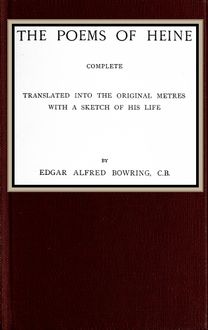The poems of Heine
- Talia Garzahar citeretfor 3 år siden“According to M. Heine, the whole of the intellectual movement of Germany since Lessing and Kant has been a death-struggle against Deism. This struggle he describes with passion, and it may be said that he heads it in person. He ranges his army in order of battle, he gives the signals, and marches the Titans against heaven,—Kant, Fichte, Hegel, all those formidable spirits whose every thought is a victory, whose every formula is a cosmogonic bouleversement. Around them, in front or behind, are grouped a crowd of writers, theologians and poets, romance writers and savans. If one of the combatants stops short, like Schelling, the author overwhelms him with invectives. If a timid and poetic band of dreamers, such as Tieck, Novalis, Brentanc, and Arnim, try to bring back this feverish Germany to the fresh poetry of the middle ages, he throws himself upon them and disperses them, like those Cobolds in the ‘Book of Songs’ who overthrew the angels of paradise. And when the philosophical conflict is over, he predicts its consequences with a sort of savage delirium.... He compares Kant to the bloodthirsty dic
- Talia Garzahar citeretfor 3 år sidenFrenchman since Voltaire.” He wrote French as fluently as German; and the translations of his various works that were published in Paris in the Revue des deux Mondes and the Bibliothèque Contemporaine, or as separate works, were either written by himself, or by his personal friends under his own immediate superintendence.
- Talia Garzahar citeretfor 3 år sidenFrom that time, France became his adopted fatherland, and he himself was thenceforward more of a Frenchman than a German. The Germans have indeed always reproached him as being frivolous and French; he has often been called the Voltaire of Germany; but Thiers perhaps described him the most accurately when he spoke of him as being “the wittiest
- Talia Garzahar citeretfor 3 år sidennot even the most sacred subjects being exempt from the poet’s mocking sarcasm.
- Talia Garzahar citeretfor 3 år sidenThese remarkable poems exhibit the whole nature of Heine, free from all disguise.
- Talia Garzahar citeretfor 3 år sidengod. How proud I then was of my divinity! What an idea I had of my grandeur! Alas! that charming time has long passed away, and I cannot think of it without sadness, now that I am lying stretched on my back, whilst my disease is making terrible progress.”
- Talia Garzahar citeretfor 3 år sidenI rather felt humiliated at passing for a purely human creature,—I whom the philosophy of Hegel led to suppose that I was a
fb2epub
Træk og slip dine filer
(ikke mere end 5 ad gangen)


